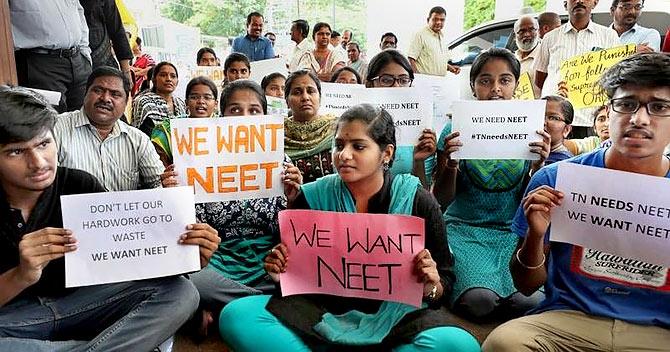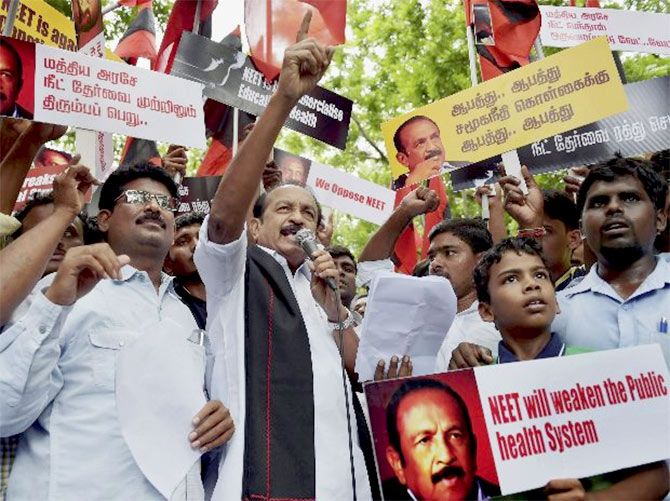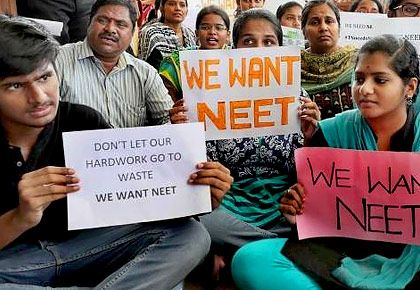While the start may have been rocky, with renewed syllabus and coaching, students and teachers in Tamil Nadu are largely in favour of the medical entrance exam, discovers A Ganesh Nadar/Rediff.com

The National Eligibility cum Entrance Test, formerly known as the All India Pre-Medical Test for medical and dental colleges, was held across the country on May 4, including in Tamil Nadu where it has faced stiff opposition since its introduction in 2013.
In fact, soon after it was introduced, several medical colleges across Tamil Nadu had obtained a stay against it and conducted their own exams.
Over the years, the stay was removed and NEET became compulsory and a standardised test for admission throughout the country.
In Tamil Nadu, it made a disastrous entry three years ago.
Since it is a national level exam, many students were assigned centres outside the state. Medical aspirants had a tough time traveling particularly in May when tickets were unavailable owning to summer vacations.
What added to their woes was that the Tamil Nadu state board syllabus taught in Classes 11 and 12 had nothing in common with the NEET question paper.
The students fared disastrously and there was nationwide condemnation and opposition to continuing with the exam. Sensing the public mood, then chief minister J Jayalalithaa even promised in her election campaign in 2016 to do away with NEET if re-elected.
In the second year, the students who had attended coaching classes, fared better.
In 2018, a 19 year old committed suicide in Senji town in Villupuram district allegedly as she was unable to clear the NEET in her second attempt, which had led to a debate on whether the exam needs to be done away with.
In 2019, the Tamil Nadu government introduced coaching for students to help them prepare for the exam.
Simultaneously, the syllabus for Classes 11 and 12 were changed and new text books have been issued that are more in tune with the NEET.
While it may seem like Tamil Nadu has finally taken NEET by the horns, M K Stalin, president, Dravida Munnetra Kazhagam, raised his banner of revolt against the entrance examination.
If the United Progressive Alliance -- of which the DMK is a constituent -- was voted to power, the first thing he would to do is get NEET scrapped for Tamil Nadu, Stalin declared.
Rediff.com spoke to students and teachers to find out if they had come to accept NEET.
Anirudh Vivekanandan appeared for NEET in 2018 and found the exam difficult due to lack of proper coaching.
"There are two years of coaching for NEET which I did not attend. Those students who attended the classes did well. Also, I took bio-technology in Classes 11 and 12, so I found the paper difficult."
While Anirudh took the IIT-JEE and is currently pursuing engineering, he feels that students who study biology will find NEET easier.
"I attended two years coaching for JEE (the Joint Entrance Examination) and cleared the main (exam). I did not do well in the (JEE) advanced exam. For JEE coaching classes, I had to pay Rs 140,000 as fee. Now that they have changed the syllabus for Classes 11 and 12 so future students will find NEET easier."

Kaviya Shree appeared for NEET in 2019 without any coaching.
"The government did conduct coaching classes, but we were not invited for that," she says.
"I appeared just to get an experience of the exam. It (NEET) is certainly a level higher than the state board exam," Kaviya felt.
"I managed to answer 75 questions out of 180. As there is negative marking for wrong answers, I did not try to guess and left the answers blank. For every right answer you get 4 marks and for a wrong answer they deduct 1 mark. If I get full marks for the 75 answers that I did write, I will get 300 marks, which is not bad as the cutoff marks for medical colleges in Tamil Nadu is 360."
Kaviya, who scored 63% in her Class 12 board examination, is planning to pursue BSc in zoology.
She feels that unlike her, students who will take the exam in 2020 will perform better as the new syllabus is in sync with the NEET.
S Mrithika paid Rs 45,000 for a one-month crash course to prepare for NEET this year.
"It was okay," is how Mrithika describes writing the exam.
"I was scared because of the negative marking. I didn't do very well because I attended only a crash course for one month which was not enough."
"I would definitely done better if I had attended the two year course. I answered 120 questions out of 180."
Mrithika scored 70% in Class 12 and is planning to study visual communication.
NEET has 180 questions questions on three subjects -- physics, chemistry and biology.
Biology comprises 50% of the questions while physics and chemistry make up for the remaining 50%.
R V Venkateswaran, who teaches physics and has previously worked in CBSE and ICSE schools, feels if students went beyond rote learning, they may be able to score better in NEET.
"Most Class 12 board toppers fail after they enter Anna University to study engineering. Do you know why? They fail because they are learning it by heart (by rote). They study with a blueprint that provides both questions and answers. In NEET, you have to think," he points out.
"The new syllabus is very good. It will take two years to set in and after that our students will perform well in NEET," Venkateswaran says.
Sheeba Deva, who teaches biology for Class 12 students, is hopeful that NEET will offer a level playing ground for deserving students.
"I feel NEET is very good as it gives equal opportunity to everybody irrespective of which board they have studied under. Earlier, poor students were not doing very well in HSC as they don't have the money to attend private coaching."
"If an economically poor student gets good marks in NEET s/he can get into the best colleges by paying nominal fees. In NEET the higher marks you get, the lesser the fees you pay. It awards merit."
"Three years ago, a student who got 65% in the Class 12 board examination scored very good marks in NEET and entered medical college," she points out.
"The new syllabus is very good. It encourages analytical thinking, it teaches out of the box thinking which is not there in the present syllabus."
"The syllabus has been updated keeping NEET in mind. I expect our students to do very well in two years time."
Sebastian Rosario, who teaches chemistry, also agrees that the new syllabus will help students crack the exam.
"NEET has put too much pressure on the students of Tamil Nadu. Earlier, each state was holding its own entrance exams. NEET is a totally different kind of test."
"To read and understand a NEET question our students need 6 minutes and they are supposed to answer in one minute. It is impossible for them."
"In the last three years there has been tremendous improvement. Earlier they knew only 20% of NEET and now they know 70%."
While Rosario is in favour of the new syllabus, he feels teachers need to be trained so that they can help students crack the exam.
V Uma, who privately trains students to appear for the NEET exams, feels the new syllabus and NEET encourages students to think so they can develop analytical skills.
"Only one state cannot stop NEET. They are misguiding the students. We have to teach them to compete with other states."
"Most students cannot afford to attend private coaching classes for NEET. They have to be taught along with their regular classes. They have to be taught to have an enquiring mind set, an analytical mindset, they must stop learning by heart.
"(In the old syllabus) When they (teachers at school) solve a question in class, suppose the answer is 5 cm. In the exam also they ask the same question and the answer is also 5 cm. (Ideally), they must change the numbers so that the answer is 10 or 15 cm. Only then will the student think and do the sum; they will not learn it by heart and come to the exam hall."
Another concern Uma has is that students ignore the Class 11 syllabus and focus on the Class 12 syllabus.
"They must teach both syllabuses as they do in Andhra Pradesh where your Class 11 marks matter for your Class 12 certificate."











